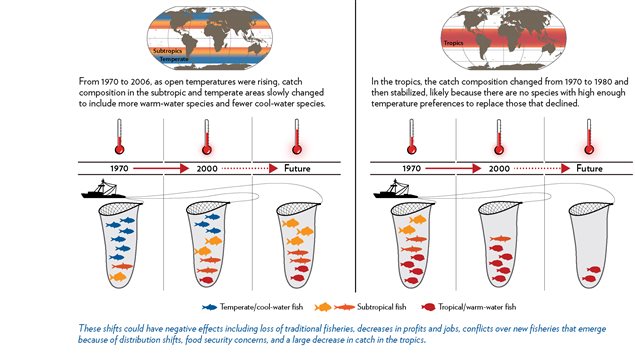Hot fish moving away from tropics
A new study reinforces what fishermen are already seeing, which is that due to global warming they are catching different species of fish in their catch, fish normally seen in more tropical areas. This means species are moving away from the tropics towards more northerly and southerly regions where the water is cooler.
William Cheung is an associate professor at the Fisheries Centre at the University of British Columbia, and co-director of the Nereus Programme
Listen
Professor Cheung and Miranda Jones research was published in the latest edition of the ICES Journal of Marine Sciences. (abstact here)
The UBC researchers used a combination of three different mathematical models combined with the latest climate data in relation to over 800 commerically important fish and invertebrates to estimate how they will react to warming ocean temperatures.
Important species like cod, tuna, herring and halibut are included.
Using current warming projections of the International Panel on Climate Change (IPCC), the study showed that in worst case scenario of ocean warming of 3-degrees C by 2100, fish will move northward or southward at a rate of some 28 km per decade, while in a best case scenario of 1-degree C of warming, fish will move at about 15 km per decade.

The researchers say this is consistent with what is already happening. To verify their projections, they used the same modelling and compared it to known movements of the past 30 years and found the computer models matched actual data.
Professor Cheung cited the case of Atlantic mackerel which are moving from traditional areas toward Ireland and Iceland. He says that this is causing international disagreements as a greater percentage of the overall international mackerel quota is now being caught in these areas reducing fish available in other areas.
Rare tropical fish coming to New Brunswick
Meanwhile researchers say the tropical regions, where people are heavily reliant of fish, will be the big losers as fish move away. Some specific regions may become almost devoid of fish.
Cooler climes may be the winners, but Cheung says, as fish seek cooler waters in different non-traditional areas, they may encounter a habitat not suited to their needs and theri continued survival comes into question. Additionally, if that is not an issue, they may come into competition with species already there with winners and losers in the quest for survival.
Therefore, Professor Cheung says governments would be wise to establish policies domestically, and begin negotiations internationally to prevent over-fishing until scientists can further study how new species will interact with existing species, and a different habitat.
He points out that unregulated fishing has led to collapse of stocks in the past, and so it’s far better for governments to be conservative with fishing and begin to analyze how climate change is going to affect the marine environment and industries associated with it.
This is especially true he says as the Arctic is one of the fastest warming places on earth.
Fish thermometer’ reveals long-standing, global impact of climate change (2013)







For reasons beyond our control, and for an undetermined period of time, our comment section is now closed. However, our social networks remain open to your contributions.